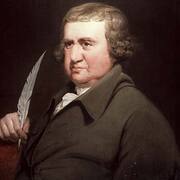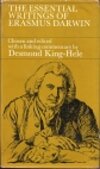Erasmus Darwin (1731–1802)
Autore di The Botanic Garden: A Poem in Two Parts
Sull'Autore
Fonte dell'immagine: Portrait of Erasmus Darwin by Joseph Wright of Derby (1792). From Wikipedia
Serie
Opere di Erasmus Darwin
PHYTOLOGIA: OR THE PHILOSOPHY OF AGRICULTURE AND GARDENING. WITH THE THEORY OF DRAINING MORASSES AND WITH AN IMPROVED… (2010) 21 copie
Beauties of The Botanic Garden 2 copie
Doctor Darwin from 1759 to 1802, the later the year of his death. Darwin's Prescription book 1 copia
To Peter Pinder (poem) 1 copia
The Botanic Garden, a Poem in Two Parts. Part 1: The Economy of Vegetation. With Philosophical Notes 1 copia
Works of Erasmus Darwin 1 copia
Etichette
Informazioni generali
- Data di nascita
- 1731-12-12
- Data di morte
- 1802-04-18
- Luogo di sepoltura
- All Saints Church, Breadsall, Derbyshire, England, UK
- Sesso
- male
- Nazionalità
- England
- Nazione (per mappa)
- UK
- Luogo di nascita
- Elston Hall, Nottinghamshire, England, UK
- Luogo di morte
- Breadsall, Derbyshire, England, UK
- Luogo di residenza
- Nottingham, Nottinghamshire, England, UK
Lichfield, Staffordshire, England, UK - Istruzione
- University of Cambridge (St. John's College)
University of Edinburgh Medical School
Chesterfield College - Attività lavorative
- physician
inventor
poet
physiologist
natural philosopher
slave-trade abolitionist - Relazioni
- Darwin, Charles (grandson)
Martineau, Harriet (lover)
Darwin, Francis (great-grandson)
Darwin, George Howard (great-grandson)
Darwin, Leonard (great-grandson)
Raverat, Gwen (great-great-granddaughter) (mostra tutto 10)
Barlow, Nora (great-great-granddaughter)
Darwin, Charles Galton (great-great-grandson)
Galton, Sir Francis (grandson)
Keir, James (friend) - Organizzazioni
- Lichfield Botanical Society
Lunar Society
Derby Philosophical Society
Royal Society (Fellow)
Utenti
Recensioni
Potrebbero anche piacerti
Autori correlati
Statistiche
- Opere
- 43
- Utenti
- 188
- Popolarità
- #115,783
- Voto
- 3.8
- Recensioni
- 5
- ISBN
- 54
- Preferito da
- 2















